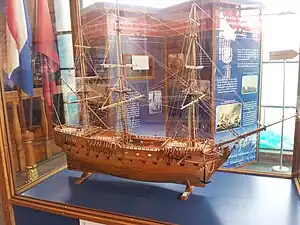Dutch ship Delft (1783)
 A model of Delft at Shipyard 'de Delft' | |
| History | |
|---|---|
| Name | Delft |
| Ordered | 27 May 1782 |
| Builder | De Hoog & De Wit at Delfshaven |
| Commissioned | 16 May 1783 |
| Out of service | 19 January 1795 |
| In service | 19 January 1795 |
| Captured | 11 October 1797 |
| Fate | Sank on 15 October 1797 |
| General characteristics | |
| Class and type | 56-gun fourth-rate ship of the line |
| Tons burthen | 1,04787⁄94 (bm) |
| Length | 144 ft 7 in (44.1 m) (gundeck); 118 ft 7 in (36.1 m) (keel) |
| Beam | 40 ft 10 in (12.4 m) |
| Depth of hold | 16 ft 5 in (5.0 m) |
| Propulsion | Sails |
| Sail plan | Full-rigged ship |
| Armament | |
Delft was a Dutch 56-gun fourth-rate ship of the line of the navy of the Dutch Republic and the Batavian Republic.
The order to construct the ship was given on 27 May 1782 by the Admiralty of the Meuse. Delft was commissioned on 16 May 1783 by the United Netherlands Navy.
On 24 December 1787 Delft set sail on a mission against the Barbary pirates and protected Dutch traders in the Mediterranean Sea.
For the ship's second mission starting 31 May 1793 Theodorus Frederik van Capellen became the new commanding officer. During this mission he freed 75 Dutch slaves from Algiers.
In 1795 the French conquered the Dutch Republic and the new Batavian Republic was founded. The French initially disarmed Delft because they feared that Orangist rebels would use her, but later the Dutch reactivated her to participate in the war with Britain. Gerrit Verdooren van Asperen became her captain.
On 11 October 1797 Delft took part in the Battle of Camperdown. After heavy fighting she struck to the British; she sank off Scheveningen four days later while being towed to Britain.
During the battle the British captured the Dutch Hercules under Captain G.J. van Rijsoort. They renamed her HMS Delft, in honour of the brave resistance Delft had made in the battle.[1]
Since 2001 till 2018 work had been under way in Rotterdam to build a replica of Delft at Historical Shipyard 'de Delft' (Dutch: Historische Scheepswerf 'de Delft') in Delfshaven, near to the place where the original ship was built.
Citations
- J.F. Fischer Fzn. De Delft: De dagjournalen met de complete en authentieke geschiedenis van 's Lands schip van oorlog Delft en de waarheid over de zeeslag bij Camperduin (Franeker: Van Wijnen, 1997), 394.